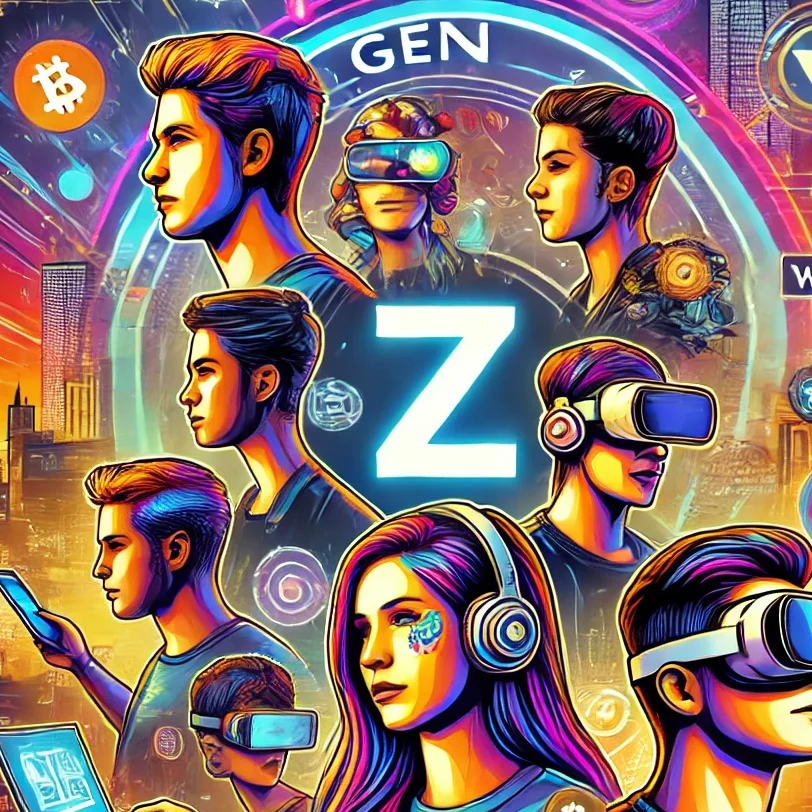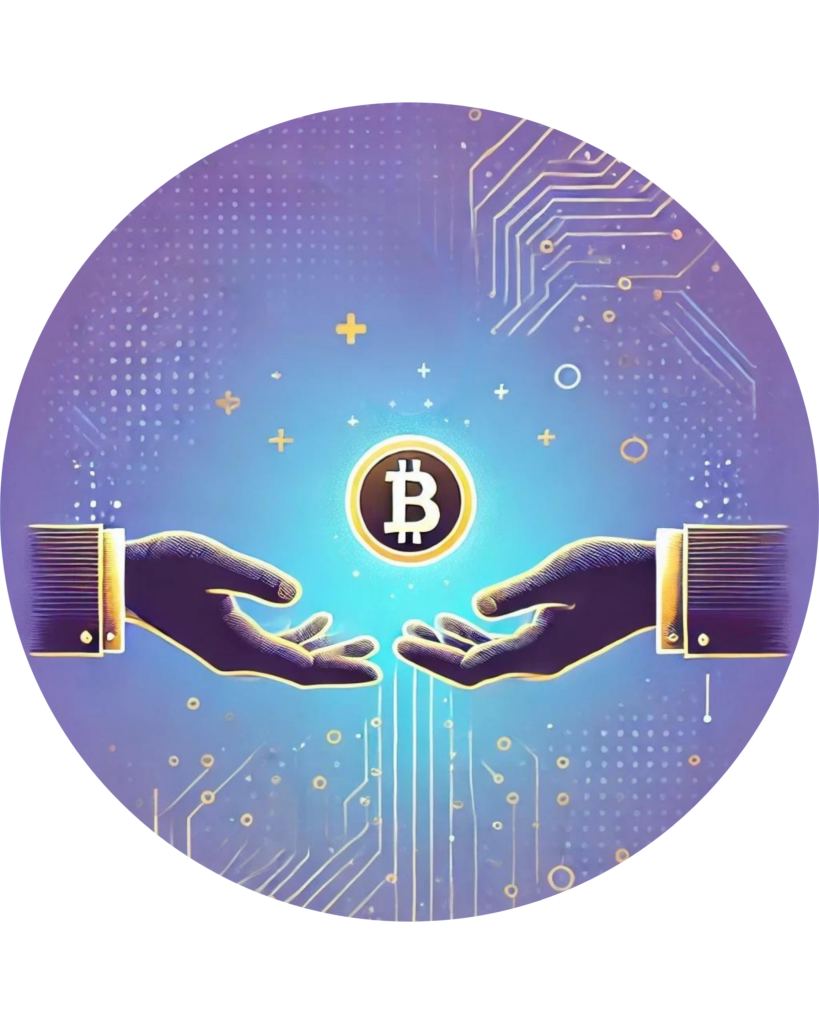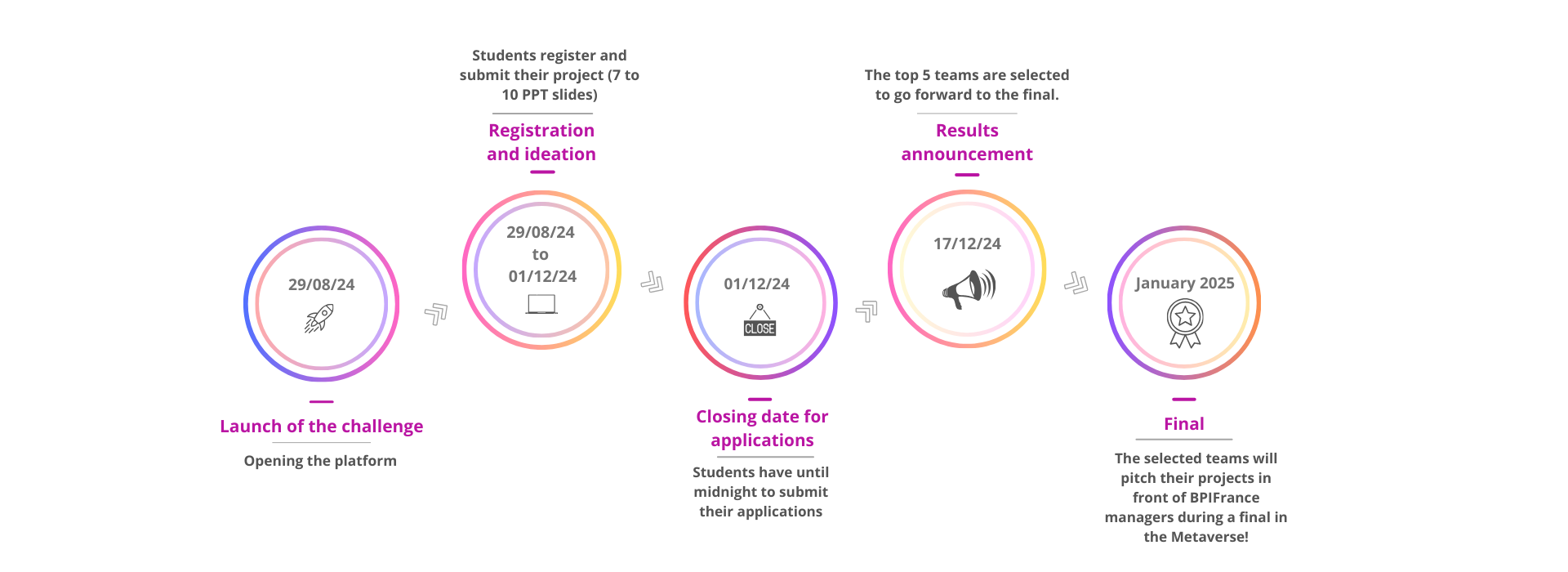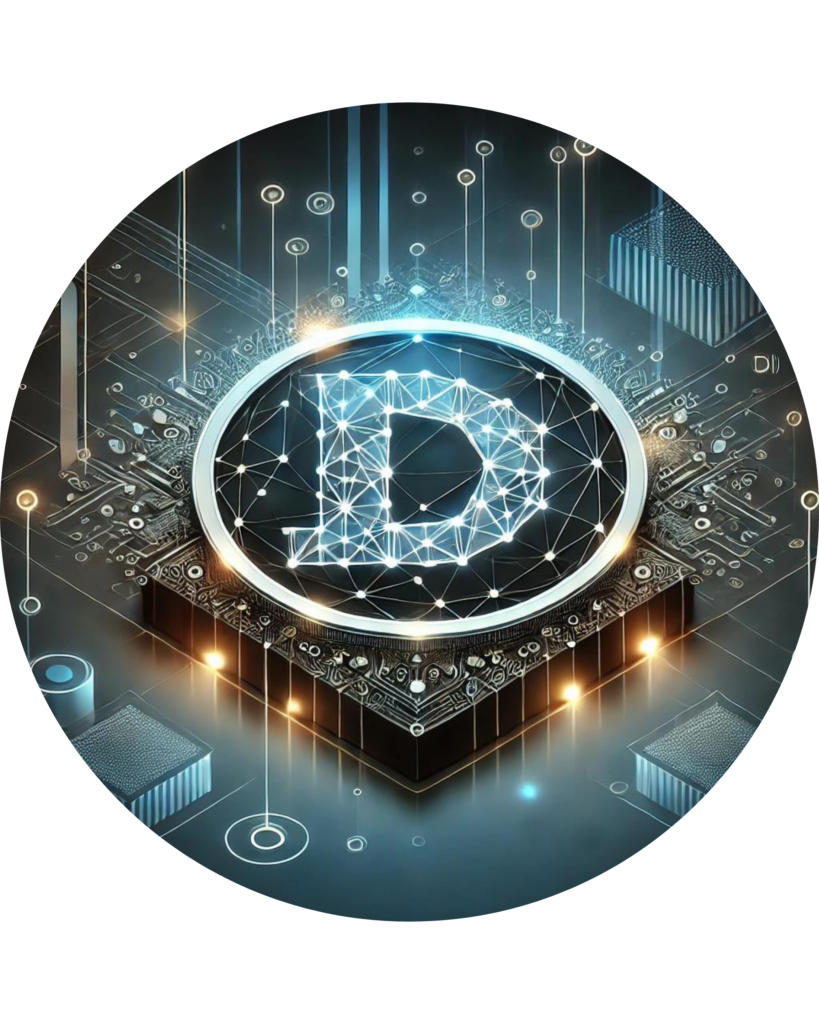
🇫🇷 FRENCH VERSION HERE 🇫🇷
Join the Web3 revolution with the 2024 edition of the
Web3 Project in partnership with BPIfrance! 🚀
We invite all visionary students from Bac+1 to MBA to present their innovative ideas and concepts that will shape the future of Web3.
Working in teams of 2 to 5, this unique business game will give you the opportunity to showcase your innovative solutions and be part of the digital transformation that is redefining the way we interact online.
Whether you’re focused on decentralising data, improving digital security, advancing blockchain technologies, creating decentralised applications (dApps), optimising crypto-currency transactions, or any other innovation that makes the web more secure, transparent and efficient, we want to hear from you!
Submit your project now in 7 to 10 PPT slides and pitch your ideas in front of BPIfrance managers!
Choose one of the following topics:

Decentralised Identity
How can a decentralised system respond to the problem of identifying a person or anything else?

Web3 & GenZ
How can brands better understand the needs of Gen Z thanks to Web3?

Web3 for Good
How can Web3 motivate donors to do good actions? How can we restore their trust?
Prizes to win

Team 1: Each team member will receive a €200 gift voucher.
Team 2: The team will receive a “Virtual Reality: VR Immersion” box set for an unforgettable team experience in a virtual world.
Team 3: The team will receive a “Virtual Reality: VR Immersion” box set for an unforgettable team experience in a virtual world.
Ready to participate?

The final
The Web3 Project final will take place in January 2025. The 5 finalist teams will have the opportunity to be spotted by BPIFrance managers and to pitch their projects in the Metaverse. A unique experience not to be missed!
Decentralised identity 🪪
Currently, the identity of a person or company is verified by official documents issued by the State (identity cards, passports, driving licences, KBIS excerpts, etc.) and stored in centralised databases.
Online, we often provide personal data (name, address, telephone number, payment details) to companies, which can pose problems of security, confidentiality, fraud, exclusion of people without access to official documents and dependence on slow, cumbersome bureaucracies.
How can Web3 and blockchain be used to manage the identification of an individual or other person by a decentralised system?
Solutions have already emerged!


Web3 & GenZ 🎯
Brands are looking for new ways to attract Gen Z, an elusive and demanding generation. The latter has new expectations: immersive digital experiences, total transparency, unprecedented interactivity, responsible action and, above all, fun!
This is where Web3 comes in to transform the way companies interact with their customers.
Imagine a world where :
- Gamification is everywhere,
- Every interaction with a brand becomes a captivating game,
- Data is protected and used ethically,
- Every action, every choice, is rewarded in a tangible way,
- Loyalty is cultivated through unique and secure experiences.
It’s up to you to imagine this world!
What will be the next innovative solution to help brands better understand the needs of Gen Z thanks to Web3?
Web3 for good 💝
Charitable initiatives are at the heart of the concerns of many organisations and individuals. However, the transparency and traceability of donations and actions are often called into question. Blockchain, with its ability to provide a transparent, immutable and decentralised register, offers a potential solution for ensuring the traceability and transparency of good deeds.
Imagine the donation world of tomorrow where :
- Every donation made is traced from end to end, from the donor to the final impact.
- Charity donors can check in real time what resources have been allocated to them.
- Charities are held accountable for the use of funds through total transparency.
- Donors receive immutable digital proof of their contribution and its use, as well as rewards.
It’s up to you to imagine this world! What will be the next innovation to motivate donors to do good deeds thanks to blockchain?



Step 1 : Idéation
You have until midnight on 1 December 2024 (00:00 UTC+1 – Paris time) to submit your 7 to 10 slide PowerPoint or PDF file in French or English on the challenge platform.
To register:
Step 1: I register individually
Each student must register individually by clicking on the link below and accept the rules.
Step 2: I submit my application
Once you have registered, you will receive an e-mail with a link enabling you to create your team and submit your application.
One person per team with a Gmail account will send the file. Check your spam folder to see if you have received the e-mail or write to contact@educatia.fr.
🔥 Download the template for your project by clicking here (“file” then “download”). 🔥
Step 2: Selection
Juries from BPIfrance will assess all the projects submitted by the students. The 5 best teams will be selected to pitch their project at the grand final.
You will automatically receive the results by e-mail.
Step 3 : Final
The 5 best teams selected will pitch their project during a 10-minute presentation followed by a 5-minute question and answer session. The final will take place in the Metaverse! The 3 best teams will be rewarded. 🎁
Rules – Web3 Project – Edition 3
Preamble
Bpifrance has launched a competition for students with the aim of promoting and encouraging innovative ideas on the theme of Web3.
The terms and conditions for entering the competition and selecting the winners are described in these rules, hereinafter referred to as the “Rules”.
ARTICLE 1: Organiser
This competition is organised by :
Bpifrance, a public limited company with capital of €5,440,000,000
whose registered office is located at Maisons-Alfort (94710), 27-31, avenue du Général Leclerc.
Registered with the Créteil Trade and Companies Register under number 320 252 489, (“The Organiser”).
Bpifrance will hereinafter be referred to as “The Organiser”.
The organiser has called on a training company to help them organise the Competition: Educatia, a one-person simplified joint stock company with its registered office at 1 square d’Urfé, 75016 Paris, registered with the Paris Trade and Companies Register under number 908 943 723 (“The Provider”).
Article 1 – Purpose of the competition
The competition is completely free.
The purpose of this competition organized by the Organizer is to train and educate students (“hereinafter the Candidate(s)”) on the decentralized Web, known as Web3, through an innovation call for projects, in which they can participate regardless of their academic background and professional experience. The Candidates will be able to propose innovative project ideas on the theme of Web3 (“hereinafter the Competition”).
Article 2 – Conditions of participation
Registration and participation in the Competition imply and entail unreserved acceptance of these Rules in their entirety, as well as of the decisions concerning any aspect of this Competition, which shall be final and binding. Failure to comply with the Rules will result in the immediate cancellation of the application, participation and possible award of prizes.
This competition is open to all students meeting the conditions listed below:
– any natural person aged eighteen (18) or over;
– currently enrolled in a (French) higher education establishment or a recent graduate of (French) higher education who has been enrolled for less than 2 years in relation to the 2022 academic year and can provide proof of this in the form of a student card or certificate of attendance;
– residing in France at the time of registration for the challenge;
Registration under a false identity or using the identity of another person, providing false information or registering under several identities will result in cancellation of participation.
Projects submitted by Candidates must comply with the legal requirements in force.
Only one entry per person will be accepted.
Article 3 – Competition procedure
The Competition will run from 29 August 2024 at 9:30am UTC+1 to 30 January 2025 at 11:59pm UTC+1.
- Registrations
The Contest registration phase is open from 29/08/24 at 09:30 (UTC+1) to 01/12/24 at 23:59 UTC+1. Hereinafter referred to as the “Registration Phase”.
To take part, the Candidate must register on the dedicated site provided by the Provider, available at the following address: https://educatia.fr/web3-project-edition-3-fr/ hereinafter the “Contest Site” in order to:
- fill in a registration form,
- create a team
- submit their deliverables no later than 01/12/24 at 23:59 UTC+1.
For your application to be validated, you will need to enter the following information on the form: your surname, first name, gender, telephone number, school name, type of school, year of study and town where you are studying.
Candidates must form a team (from (2) two to (5) five members maximum, hereinafter referred to as the “Team” or a “Team”).
The competition will be held face-to-face or remotely, depending on the stages involved.
Each Candidate may be a member of only one Team for the duration of the Competition. Each Team will determine as it sees fit the material and, in particular, the time conditions for carrying out its project.
Any form that is incomplete or contains inaccurate, erroneous or false information, or more generally does not comply with the stipulations of these rules, will not be taken into consideration and will be considered invalid.
- Selection phase
This project selection phase will take place from 01/12/24 to 13/12/24.
A maximum of five (5) projects per Organiser will be selected by the jury on the basis of the evaluation criteria set out in Article 5. At the
end of this selection phase, five (5) Teams will be selected to enter the Final Stage
. Candidates will be informed of the results of the first selection stage before 18/12/24.
- Final
The teams selected to take part in the Final stage will be contacted directly by the Organiser or the Provider.
The Organiser reserves the right, at their sole discretion, to disqualify any Team that does not confirm its participation in the Final stage after the results of the selection phase have been announced. This disqualification, if applicable, may not give rise to any compensation from the Organiser.
The Final will consist, for each Team, of an oral presentation of their project by the Candidate(s) who are members of the Teams selected for the Final. Teams are
asked to produce a digital presentation aid for their oral presentation.
The presentation rules for the Final will be announced when the results of the selection phase are announced.
At the end of the Final, the jury will rank the finalist teams and determine the winners on the basis of their project and their oral presentation.
Article 4 – Characteristics of Deliverables
During the registration phase of the Competition, Candidates may upload, via the Competition Website, any type of document or file to present their solution or project as a response to the Competition. Hereinafter referred to as the “Deliverable(s)”.
Participation is limited to one Deliverable per Team.
Any application that is incomplete, non-compliant or submitted after the deadline will not be accepted.
The Deliverable must :
- respond to the theme submitted by the Organiser as part of the said Competition;
- be in one of the following formats: .doc, .docx, .pdf, .ppt, .pttx, .mp3, .mp4 ;
- be written in French or English;
- and comply with the conditions laid down in the Regulations.
If a Deliverable cannot be uploaded, is not in the correct format, or is incompatible, illegible or unintelligible, the project will be disqualified.
By submitting a Deliverable, Candidates declare and guarantee that the Deliverable consists solely of contributions from the Team in question.
If third-party content has been used in the preparation of the Deliverable, Entrants warrant to the Organiser that all rights, permissions and agreements necessary to submit the Deliverable and to grant the rights referred to herein have been obtained.
The existence of a contribution from a third party in breach of these rights will result in the disqualification of the Deliverable and the Candidates concerned.
Entrants warrant to the Organiser that no other natural person, legal entity and/or legal person of any form whatsoever may claim any right whatsoever in the Deliverable submitted as part of the Competition.
Candidates warrant to the Organiser that the content of the Deliverable does not and will not infringe any third party rights, including (but not limited to) intellectual property rights, the right to privacy, competition law, confidentiality, or any other contractual or non-contractual right.
Any Deliverable suspected of violating the rights of third parties and/or one or more laws will be ineligible for the Competition.
Respondents are responsible for all costs and expenses relating to the preparation and submission of Deliverables. Respondents are solely responsible for any Damaged, Lost, Delayed, Incomplete, Invalid, Incorrect or Misdirected Deliverables.
Article 5 – Jury and assessment criteria
The composition of the jury will be freely determined by the Organiser. Each Organiser will select the Teams of its choice during the selection phase and the Final.
The jury will be sovereign and will not be required to justify the choice of the teams selected during the various stages or the allocation of the prizes.
The jury will evaluate, rank and select the deliverables submitted on the basis of the following criteria:
- Technical and legal feasibility of the solution: speed of implementation of the proposal as part of an experiment
- Coherence of the project: understanding the challenges of Web3 and the needs and expectations of the target audience
- Meeting functional and technical requirements
- Innovative nature of the solution: use of innovative technologies
At the end of the selection phase, and with the exception of the provisions set out below, a maximum of 5 projects per Organiser that have received the highest ratings from the jury will go through to the Final.
At the end of the Final and with the exception of the provisions set out below, the Organiser’s 5 finalist Teams will be ranked by the jury. This ranking will be used to award the prizes specified in Article 7 of these Rules.
Article 6 – Prizes
The prizes refer to the prizes awarded to the winners of the Competition as defined below.
Depending on their ranking, the winners will receive the prizes described below.
The prizes are awarded to the winners of the Competition and are subject to compliance with the following cumulative conditions
- compliance by the winning Candidates with the conditions of participation set out in Article 2.
- The delivery by the team of a Deliverable that complies with the criteria set out in Article 6;
- The acceptance of and compliance with these Rules by each Candidate in the team;
No prize can be awarded to winners who do not meet these three cumulative conditions
The winners of the Organiser Bpifrance will receive :
Lot for the 1st team :
Each member of the first team will receive a gift voucher worth €200 (incl. VAT).
Lot for the 2nd team :
The team will receive a Live Escape Box (worth €130 incl. VAT)
Lot for the 3rd team :
The team will receive a Live Escape Box (worth €130 incl. VAT)
If the prize is unavailable or out of stock at the time the winner is designated, the Organiser reserves the right to award a prize of equivalent nature and value.
No prize will be awarded to a winner who does not meet the conditions of these Rules.
The nature of the prizes offered may not be contested in any way. The prize won may not be exchanged for cash or vouchers.
In the event that a prize is awarded to a Candidate who does not meet the conditions for participation at the time of registration or at any time during the Contest, the Organiser and the Provider reserve the right to demand that the Candidate return the prize awarded.
The Organiser and the Provider shall not be held liable for the quality of the prizes or any consequences arising from the possession of a prize. The Organiser and the Provider cannot be held responsible for any incident/accident that may occur during the use of the prize.
The Organiser and the Provider reserve the right to carry out any and all checks and to request any and all supporting documents necessary to verify the conditions of participation in the Contest and the conditions for awarding the prize.
Article 7 – Intellectual property
Definitions.
For the purposes of this article, :
– Intellectual property rights” means any invention, copyright or other rights relating to a trademark, design or model, patent and, more generally, any item (including business secrets and know-how) that may be protected by national and/or international laws or conventions relating to intellectual property (“Intellectual Property Rights”);
– Prior rights”: any intellectual property rights and/or associated know-how held by Candidates prior to the start date of the Competition (“Prior Rights”);
– Creations”: any software (including source code and object code), database, technical specification, text, design, model, information, knowledge, method, process or product, as well as any element and/or process resulting therefrom, developed by a Candidate as part of a Deliverable submitted during the Competition and which may be protected or is likely to be protected under the national and/or international laws and conventions relating to intellectual property in force (“the Creations”).
Non-counterfeiting guarantee. By submitting a Deliverable or a Creation, at any stage of the Competition, each Candidate guarantees to the Organiser that he/she is the co-owner and/or the co-owner with the members of his/her Team of the Intellectual Property Rights relating to all or part of the Creations contained in the Deliverables, and/or that he/she has obtained all the necessary rights and authorisations relating to these pre-existing Creations or those belonging to a third party, enabling them to propose the Creations and Deliverables concerned to the Organiser.
When entering the Competition, Candidates must use only royalty-free sources wherever possible. Any intellectual property belonging to a third party, including third-party software, must be identified with its version, the applicable licence terms or any other details concerning its use. The Organiser will take these elements into account when selecting the winners of the Competition. Under no circumstances may projects infringe an intellectual property right or a right of publicity.
Declarations and guarantees
Each Candidate member of the Team concerned individually declares and guarantees:
that he/she is the co-owner and that he/she holds, without restriction or reservation, all the intellectual property rights enabling him/her to propose the Deliverables and Creations submitted as part of the Competition.
-that it has arranged with the members of its Team, where applicable, the authorisations, agreements, assignments or licences of rights necessary for the exploitation and use of the Deliverables and Creations, with any third party who may hold rights to all or part of the elements making up the Deliverables;
Each Candidate declares that he/she owns all the rights to his/her production and personal participation relating to the Deliverables and Creations and guarantees the Organiser against any opposition, action or claim from third parties.
In particular, he/she declares that his/her work is original and free from any borrowing from another work likely to incur the Organiser’s liability.
Under no circumstances may their production or personal participation contravene current legislation, incite hatred or be offensive.
Each Candidate guarantees to the Organiser that each of the Projects and Deliverables does not constitute an infringement, an act of unfair competition or any other violation of a right belonging to a third party.
Any Deliverable that has been prepared by several Candidates constitutes a collaborative work and should be treated as such under the applicable regulations in force.
Prohibition on the use of the Organiser’s distinctive signs
Candidates undertake not to use the Organiser’s distinctive signs (including registered trademarks and logos) without the Organiser’s prior written consent.
Responsibility.
Under no circumstances may the Organiser be held liable for any breach by Candidates of the above provisions. Each Candidate shall indemnify the Organiser in the event of claims, oppositions, actions or attempted eviction by a third party relating to any of the Creations contained in the Deliverables. Candidates guarantee the Organiser against any action by a third party, in particular for infringement, relating to any intellectual property right used, transferred or granted in the context of the Competition. This guarantee covers all amounts that the Organiser would have to bear as a result of the action and/or claim concerned.
It is further specified that nothing in these Rules may be interpreted as conferring on Candidates any right of ownership over the trademarks, names, logos and other distinctive signs owned by the Organiser.
Each Participant remains the owner of his or her prior rights and of all intellectual property rights relating to his or her Creations.
The Organiser may not, under any circumstances, be held liable for any damage caused by the failure or delay in the delivery of the Deliverable and, in particular, by the refusal to take this Deliverable into account due to a submission outside the deadlines set out in the rules, by the failure or delay in the delivery of any e-mail sent as part of the competition or by any alteration made to the Deliverable independently of the Organiser’s fault.
The Organiser may not be held liable for the consequences of a Candidate’s disqualification due to a breach of the rules.
User licence
By taking part in this Competition, the winners of the Teams selected by BPIfrance agree to grant BPIfrance a licence for the Creations making up the Deliverable and the Deliverable itself for a period of one (1) year from the date of the Competition Final.
This licence is exclusive, worldwide, transferable within the Organiser’s group of companies and royalty-free.
This licence includes, but is not limited to, the right to use, exploit, reproduce (in whole or in part), represent, display (in whole or in part), incorporate or integrate, analyse, adapt, modify, disseminate, arrange, transform, translate, including for commercial purposes, any element contained in the Designs, as well as any prior rights necessary for the exercise of the rights thus granted (hereinafter the “Granted Rights”).
The Parties will formalise the concession in writing.
Promise to transfer rights (purchase option)
By accepting the Rules, the Candidates making up the Teams that have been selected as the winners of each Organiser agree to grant the Organising Company that selected them a unilateral promise to assign all or part of the intellectual property rights associated with the Deliverables and the Creations that make up the Teams submitted during the competition.
As part of the promise to transfer Intellectual Property Rights mentioned in this article, Candidates declare that they possess the rights enabling them to transfer Intellectual Property Rights to the Organiser in respect of the Deliverables and Creations presented during the Competition.
Candidates expressly guarantee that, prior to submitting the Deliverables and/or Designs, they have obtained from all third parties directly or indirectly involved in the production of the Deliverables and/or Designs, including in particular any other person likely to be able to claim intellectual property rights over them, the assignment or concession of their rights or their authorisations allowing the Organiser to use the said Deliverables and Designs in accordance with the conditions hereof.
It is understood that the Organiser retains complete freedom to exploit the Deliverables and/or Creations directly with any third party of their choice and in particular in association with any other Creation, or not to exploit them.
As an exception to the above stipulations, if the legal feasibility of transferring the Intellectual Property Rights concerning all or part of the Deliverables and/or Creations cannot be determined, Candidates undertake to contact the Organiser in order to inform them as soon as possible. In this case, Candidates undertake to contact the third parties holding the rights in order to reach an agreement, so that the Intellectual Property Rights can be transferred to the Organiser.
This promise is subject to the following cumulative rules:
- The Organiser will benefit from a unilateral promise of exclusive transfer for a period of twelve (12) months from the date of the announcement of the winners of the Challenge;
- It is understood that the partners and/or subsidiaries of the Organising Company concerned may benefit from this purchase option;
- The Organiser will notify the Participant in writing of their intention to exercise the option
- Negotiations will take place in good faith between the Parties concerned;
- If the Parties agree, the amount of the prize may be considered as part or all of the purchase price.
The Parties will formalise the potential assignment in writing.
Article 8 – Image rights
Throughout the duration of the Competition and for a period of one (1) year following the Final, the Organiser will be free to communicate within its company and its subsidiaries, as well as for advertising and marketing purposes, on the progress and nature of the projects in any format, medium and support whatsoever (website, advertising banners, social networks, newsletter, press release, etc.), known or unknown to date, free of charge or against payment.
The Organiser may also communicate the identity of Candidates, subject to the prior consent of Candidates obtained when they register for the Contest.
The image of the participating teams and Candidates may be used by the Organiser subject to their prior authorisation. In such a case, the Organiser will inform the persons concerned in advance and provide them with the terms and conditions and documents required for this purpose.
Article 9 – Limitation of liability
The Organiser reserves the right to postpone, shorten, extend, modify or cancel the Competition, and shall not be held liable in any way for doing so. The Provider and Candidates agree not to make any claim or request for indemnity or compensation in this respect.
Likewise, under no circumstances may the Organiser be held liable in the event of disputes with the companies responsible for the prizes offered.
The Organiser and the Provider cannot be held responsible for any disruptions to the Internet network or for access difficulties due to a large number of connected users or Candidates. They may in no way be held liable for communication or access interruptions, loss of data, computer viruses or any direct or indirect prejudice whatsoever that may be suffered by a Candidate before, during or after his/her participation in the Contest.
In addition, the Organiser and the Provider may not be held liable for any facts or damages that are not directly or indirectly attributable to them, in particular resulting from errors or delays in the submission of the Deliverables by the Entrants, including the refusal to accept these Deliverables due to their submission outside the scheduled dates, damage resulting from errors or delays in the sending of e-mails by the Participant in connection with the Contest, as well as damage resulting from any alteration made to the Deliverables beyond the control of the Organiser and the Service Provider, or from an event of force majeure likely to disrupt, modify or cancel the Contest.
Consequently, Candidates waive all recourse against the Organiser and the Provider for any damage and/or harm they may suffer in connection with the Competition, except for direct damage caused by the Organiser or the Provider.
The Organiser and the Provider may not be held liable for any incident that may occur in connection with the services provided in respect of the prizes, and any liability in this respect shall be borne by the third-party company or companies with which the winners contract directly.
The Organiser and the Provider shall under no circumstances be held liable for the consequences of the disqualification of a Participant due to the latter’s breach of the Rules.
Article 10 – Confidentiality
Entrants to the Competition undertake not to divulge to any third party other than a member of their Team any information relating to their projects prior to the announcement of the winners by the Organiser.
They undertake to guarantee the strictest confidentiality of any data, information or confidential documents of which they may become aware in the context of the Competition, or which have already been communicated to them directly or indirectly by the Organiser for the purposes of the Competition.
All information and/or data is considered confidential, regardless of its purpose (technical, financial, commercial, etc.), nature (know-how, methods, processes, etc.), medium (written documents, printed matter, samples, drawings, etc.) or method of transmission (written, oral, computerised).
Candidates for the Competition also undertake, from the date of receipt :
- To apply the same protection measures to the Confidential Information that they receive as they would apply, where applicable, to their own confidential information;
- To use the Confidential Information solely for the purposes of the Competition;
- To pass on the confidential information received only to those members of their Team who will need it strictly for the sole purpose of carrying out their mission within the framework of the Competition;
- Not to divulge directly or indirectly all or part of the confidential information without the express prior agreement of the Organiser;
- To inform the Organiser of any loss of Confidential Information as soon as possible and in compliance with the regulations in force;
- At the Organiser’s request and for any reason whatsoever, to return all Confidential Information;
- To ensure that this obligation of confidentiality is respected, in particular by the members of the Team and any partners (where applicable).
This obligation of confidentiality will not apply to information which Candidates can prove, in particular:
- they were, at the time of their communication by the Organiser, already in the public domain;
- or that, after their communication by the Organiser, they have fallen into the public domain through no fault of their own;
- or that they were already in their possession at the time they received them from the Organiser;
The confidentiality obligations in this article will come into force as soon as Candidates register and will remain in force for a period of three (3) years from the end of the Competition.
Article 11 – Protection of personal data
Participation in the Contest requires the Candidate’s personal data (“Personal Data”).
The Candidate’s Personal Data is processed electronically in accordance with regulations on the protection of personal data.
In accordance with the applicable regulations, in particular European Regulation 2016/679 and national provisions relating to data processing, files and freedoms, the Organiser, as data controller, collects and processes your personal data on the basis of your consent: the Organiser is likely to collect your surname, first name, email address, telephone number, name of your school, gender, year of study, city of your educational establishment in order to validate your participation in the Competition.
For the purposes of processing personal data, the Service Provider is designated as a Subcontractor within the meaning of the RGPD.
The purposes of this processing are :
- to meet the organisational needs of the competition;
- organising intermediation between the Candidate, the Organiser and the Service Provider;
- ensure the identification, communication and preservation of exchanges with the Candidate;
In accordance with the provisions of the RGPD, the Organiser undertakes to implement organisational and technical security measures designed to protect all Candidates’ Personal Data. Similarly, the Organiser undertakes to allow Candidates to exercise their rights under the RGPD.
The personal information collected by the Organiser from Candidates will be used exclusively to manage the Competition.
The recipients of the personal data are the Digital Department of Bpifrance for the Organiser Bpifrance.
Their recipients are the Competition Organiser and the Service Provider. No data will be passed on to any outside organisation.
Personal data is not transferred outside the European Union and Switzerland.
They will be kept for the duration of the Competition and will be kept for (1) year after the Competition has ended (prize-giving).
In accordance with the French Data Protection Act no. 78-17 of 6 January 1978 as amended, Regulation (EU) 2016/679 and the Law for a Digital Republic of 7 October 2016, and subject to the conditions laid down therein for the exercise of these rights, Candidates in the Competition benefit from:
– a right of access, rectification, deletion and portability of their personal data;
– The right to ask for the processing of their data to be restricted and to object to receiving commercial canvassing or to being profiled in connection with commercial canvassing. In certain cases, Candidates may, for reasons relating to their particular situation, object to the processing of their data.
– The right to organise what happens to their personal data post-mortem.
– the right to lodge a complaint with the CNIL.
The aforementioned rights may be exercised by contacting the Bpifrance Data Protection Officer at the postal address “Délégué à la protection des données (DPO), Bpifrance, DCCP, 27-31 avenue du Général Leclerc, 94710 Maisons-cedex” or at the email address donneespersonnelles@bpifrance.fr.
You can also contact contact@educatia.fr to exercise your rights.
The Candidate may also lodge a complaint with the supervisory authorities, in particular the CNIL (https://www.cnil.fr/fr/plaintes).
As the data collected is necessary for the proper running of the Competition, any request to delete information relating to this data is likely to result in the automatic cancellation of his/her participation.
Article 12 – Complaints
Any complaint by a Participant relating to the Contest must be sent no later than (30) thirty days after the end date of the Contest to the following e-mail address: contact@educatia.fr
Any complaint must include full contact details (name, address, e-mail address and telephone number), the reference of the Competition and a clear and detailed explanation of the complaint.
Article 13 – Applicable law and dispute resolution
These rules are subject to French law and regulations.
If any clause of these rules is deemed invalid, the other clauses and the rules themselves shall continue to apply.
Any dispute concerning the application and/or interpretation of the rules will be settled by the Organiser.
In the event of a dispute, only a registered letter with acknowledgement of receipt sent no later than thirty (30) days after the end of the Competition to the following address will be accepted: contact@educatia.fr
Any dispute or claim received by the Organiser after this deadline will not be taken into account, except in the case of obvious errors. It is agreed that the information resulting from the Organiser has evidential value in any dispute, particularly with regard to the connection elements and the computer processing of said information relating to the Competition.
Prior to any legal action relating to or in connection with these rules, Candidates undertake to make an amicable and ex gratia appeal to the Organiser.
Any dispute arising in connection with these rules which cannot be settled amicably shall be referred to the Paris Commercial Court, unless otherwise provided by public policy.
Article 14 – Legal deposit
The rules are filed via www.reglement.net with SELARL 812 – HUISSIERS, huissiers de justice associés, 88 boulevard de la Reine, 78000 Versailles.
The Rules may be amended at any time in the form of an amendment by the Organiser, in compliance with the conditions set out, and published by online announcement on the site.
The amendment shall be registered with the SELARL huissiers de justice associés, custodian of the rules, before publication. It will come into force as soon as it is put online and all Participants will be deemed to have accepted it simply by taking part in the Contest, as from the date on which the amendment comes into force. Any Participant refusing to accept the modification(s) must cease to take part in the Contest.
The rules are sent free of charge to anyone who submits a written request by post, before the closing date of the Competition, to the following address: contact@educatia.fr
The full rules can also be consulted online on the Competition website. The postal charges required to obtain the rules will be reimbursed on simple request on the basis of the slow “letter” rate in force.
